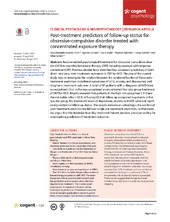| dc.contributor.author | Holm, Silje Elisabeth Hasmo | en_US |
| dc.contributor.author | Hansen, Bjarne | en_US |
| dc.contributor.author | Kvale, Gerd | en_US |
| dc.contributor.author | Eilertsen, Thomas | en_US |
| dc.contributor.author | Grøtte, Torun | en_US |
| dc.contributor.author | Solem, Stian | en_US |
| dc.date.accessioned | 2019-03-25T15:07:40Z | |
| dc.date.available | 2019-03-25T15:07:40Z | |
| dc.date.issued | 2018-04-09 | |
| dc.Published | Holm SEH, Hansen B, Kvale G, Eilertsen T, Grøtte T, Solem S. Post-treatment predictors of follow-up status for obsessive-compulsive disorder treated with concentrated exposure therapy. Cogent Psychology. 2018;5:1461542:1-12 | eng |
| dc.identifier.issn | 2331-1908 | |
| dc.identifier.uri | https://hdl.handle.net/1956/19238 | |
| dc.description.abstract | Recommended psychological treatment for obsessive-compulsive disorder (OCD) is cognitive behavioral therapy (CBT) including exposure with response prevention (ERP). Previous studies have identified few consistent predictors of both short- and long-term treatment outcomes in CBT for OCD. The aim of the current study was to investigate the relation between the combined burden of three post-treatment predictors (subclinical symptoms of OCD, anxiety, and depression) and long-term treatment outcome. A total of 97 patients with a diagnosis of OCD from an outpatient clinic in Norway completed a concentrated four-day group treatment of ERP for OCD. Results revealed that patients in the high-risk group had 2.5 times the risk (odds ratio = 10.1) of having OCD at follow-up compared to patients in the low risk group. Pre-treatment levels of depression, anxiety and OCD were not significantly related to follow-up status. The results indicate an advantage of a combined post-treatment predictor model over single pre-treatment predictors. Furthermore, we argue that the intensive four-day treatment format provides a unique setting for investigating predictors of treatment outcome. | en_US |
| dc.language.iso | eng | eng |
| dc.publisher | Cogent OA | eng |
| dc.rights | Attribution CC BY | eng |
| dc.rights.uri | http://creativecommons.org/licenses/by/4.0/ | eng |
| dc.subject | obsessive compulsive disorder | eng |
| dc.subject | predictors | eng |
| dc.subject | exposure and response prevention | eng |
| dc.subject | intensive treatment | eng |
| dc.subject | anxiety | eng |
| dc.subject | Depression | eng |
| dc.title | Post-treatment predictors of follow-up status for obsessive-compulsive disorder treated with concentrated exposure therapy | en_US |
| dc.type | Peer reviewed | |
| dc.type | Journal article | |
| dc.date.updated | 2018-07-13T08:26:24Z | |
| dc.description.version | publishedVersion | en_US |
| dc.rights.holder | Copyright The Author(s) 2018 | |
| dc.identifier.doi | https://doi.org/10.1080/23311908.2018.1461542 | |
| dc.identifier.cristin | 1579985 | |
| dc.source.journal | Cogent Psychology | |
| dc.identifier.citation | Cogent Psychology. 2018, 5, 1461542 | |

